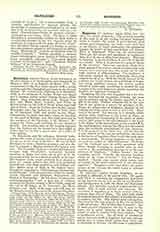

Hanxleden, JOHANN ERNST, Jesuit missionary in the East Indies; b. at Ostercappeln, near Osnabruck, in Hanover, 1681; d. in Malabar, March 20, 1732. He volunteered for the East India mission while a young student, and went through his novitiate on the journey thither. He started from Augsburg on December 8, 1699, in the company of Fathers Weber and Mayer and a German barber named Johann Kaspar Schillinger. They proceeded across Italy, through Turkey, Asia Minor, Syria, Armenia, and Persia to Bender-Abbas on the Gulf of Persia where they took ship to Surat. Both the Fathers died on the voyage. Hanxleden and a lay brother set foot in India alone on December 13, 1700, and settled in Goa Major. Thenceforth, for more than thirty years, he labored on the coast of Malabar, and died while professor in the seminary of the Christians of St. Thomas. Esteemed for virtue and erudition, he was mourned greatly. The heathen ruler of the country declared that the Paulists (as the Jesuits were then called in India) had lost in him a great man and a pillar of their religion.
To Hanxleden and his colleague, Heinrich Roth, belongs the credit of having been the pioneers among Europeans in the study of Sanskrit. He was the first European to write a Sanskrit grammar, and also the first to compile a Malabar-Sanskrit-Portuguese lexicon. The Carmelite Paulinus a Sancto Bartholomaeo brought back Hanxleden’s manuscript Sanskrit grammar to Rome and made use of part of it; he pronounced him the best Sanskrit scholar of his time. His Sanskrit works would probably have created a great stir among scholars had they been published immediately after their completion, and Schlegel and Max Muller speak of them in the highest terms. Hanxleden compiled a “Dictionarium samscredamico-lusitanum”, with the assistance of the two Jesuits, Anton Pimentel and Bernhard Bischopinck (of Borken in Westphalia). He left also a “Grammatica malabarico-lusitana” and a long list of religious poems in the Malabar tongue, a life of Christ, songs on the end of all things, on St. Genevieve, the Mater Dolorosa, etc. Many of his songs were still sung on the Malabar coast in the time of the aforesaid Paulinus.

